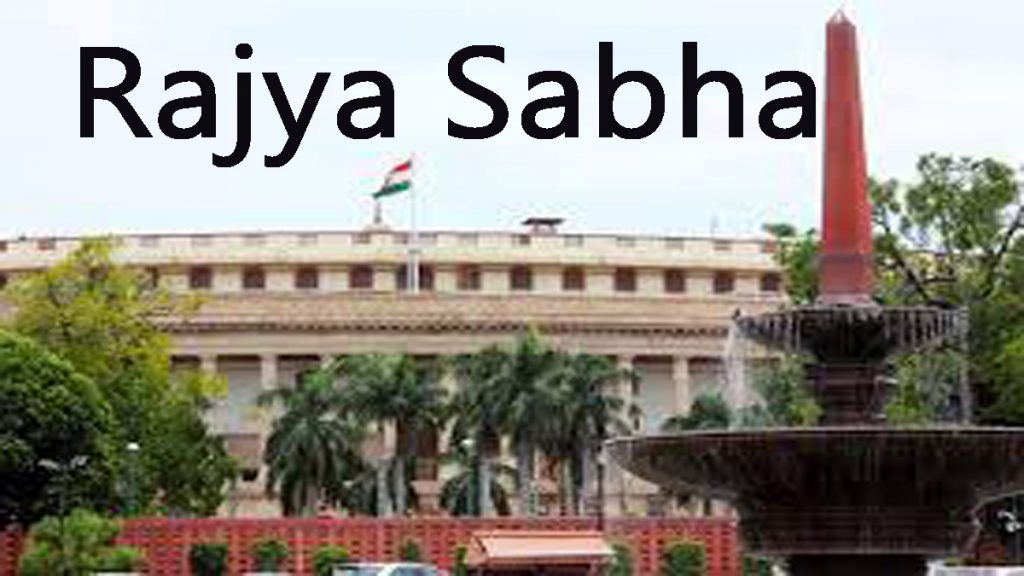Rajya Sabha passed Jammu & Kashmir Reorganisation Bill 2019

Rajya Sabha passed Jammu & Kashmir Reorganisation Bill 2019 with the support of 125 MPs, paving way for the bifurcation of the state of Jammu and Kashmir into the Union Territories of Jammu and Kashmir and Ladakh. The Bill was tabled by Union Home Minister Amit Shah after announcing that the special status granted to Jammu-Kashmir has been scrapped by modifying Article 370.
Daily Current Affairs Quiz 2019
Revoking the special status has been a long-standing demand of the BJP that has made it an election promise. The move evoked massive protest from the Opposition which asked the Union government to roll back the presidential order.
Speaking in the Rajya Sabha, Shah assured that when “the situation gets normal and the right time comes” the government is ready to make Jammu and Kashmir a state again, adding that it may take longer than expected.
The Jammu and Kashmir Reorganisation Bill, 2019 essentially proposes to bifurcate the state into two Union Territories — Ladakh and Jammu-Kashmir. The Union Territory of Jammu and Kashmir will have a legislative assembly, whereas the Union Territory of Ladakh will not have a legislative assembly and will be administered by the Lieutenant Governor alone.
-The Union Territory of Ladakh will include the districts Leh and Kargil which will, in effect, cease to be part of the existing state of Jammu and Kashmir. The remaining territories will remain with Jammu and Kashmir after the bifurcation.
-Representation in the House of People: Out of the six Lok Sabha seats in the state of Jammu and Kashmir, five will remain with the Union Territory of Jammu and Kashmir and one will go to the Union Territory of Ladakh. The Election Commission may conduct Lok Sabha elections for both the Union Territories as per the allocation of seats specified in the Delimitation of Parliamentary Constituencies Order, 1976 as amended by this act.
About the Union Territory of Jammu and Kashmir
-The Jammu and Kashmir Legislative Assembly will have a tenure of five years unless it’s dissolved earlier by the L-G. Provisions contained under Article 239a of the constitution, that are applicable to Puducherry, shall be applicable here as well. This allows the Union Territory of Jammu and Kashmir to function as a legislative assembly under an administrator appointed under the said Article. In this case, it will be the LG. “Total number of seats in the Assembly to be filled by persons chosen by direct election shall be 107,” the bill states.
The delimitation of constituencies following the bifurcation may be determined by the Election Commission. The bill states that the number of seats in the Legislative Assembly of Jammu and Kashmir shall be increased from 107 to 114.
-With this, the existing legislative council in Jammu and Kashmir stands abolished. “Every member thereof ceases to be such member and all bills pending in the Legislative Council shall lapse.”
-Four sitting members of the council of states representing the existing state of Jammu and Kashmir shall be deemed to have been elected to fill the seats allocated to the Union Territory of Jammu and Kashmir. Their term of office remaining unaltered.
-The High court of the existing state of Jammu and Kashmir will be the common High Court of the two Union Territories.
About the Legislative powers of the Union Territory of Jammu and Kashmir
-The Legislative Assembly may make laws for the whole or any part of the Union Territory of Jammu and Kashmir with respect to any of the matters enumerated in the state list except on subjects “public order” and “police” which will remain in the domain of the Centre vis-a-vis the LG.
-In case of inconsistencies between laws made by Parliament and laws made by the Legislative Assembly, earlier law shall prevail and law made by the Legislative Assembly shall be void.
-The role of the Chief Minister will be to communicate to the L-G all decisions of the Council of Ministers relating to the administration of affairs of the Union Territory and proposals for legislation and to furnish such information relating to the administration of affairs as the L-G may call for.
About the Role and powers of the Lieutenant Governor
– The Jammu & Kashmir Reorganisation Bill specifies that the Union Territory of Jammu and Kashmir and the Union Territory of Ladakh will have a common Lieutenant Governor. Satya Pal Malik, the Governor of existing state of Jammu and Kashmir, will take over the role of the common L-G “for such period as may be determined by the President of India.”
– Appointment of L-G in Ladakh: The President shall appoint the L-G under article 239. The L-G will be assisted by advisors appointed by the Centre since the Union Territory will not have a Legislative Assembly.
– In the case of Union Territory of Jammu and Kashmir, the L-G shall “act in his discretion” on issues which fall outside the purview of powers conferred on the Legislative Assembly, in which he is required to exercise any judicial functions, and/or matters related to All India services and the Anti-Corruption Bureau
– The Lieutenant Governor, may if need be-
a) prorogue the House
b) dissolve legislative assembly
– The Chief Minister shall be appointed by the L-G who will also appoint other ministers with the aid of the CM. The L-G shall also administer the oath of office and of secrecy to ministers and the CM. -The L-G will have the power to promulgate ordinances which shall have the same force and effect as an act of the Legislative Assembly assented by the L-G.